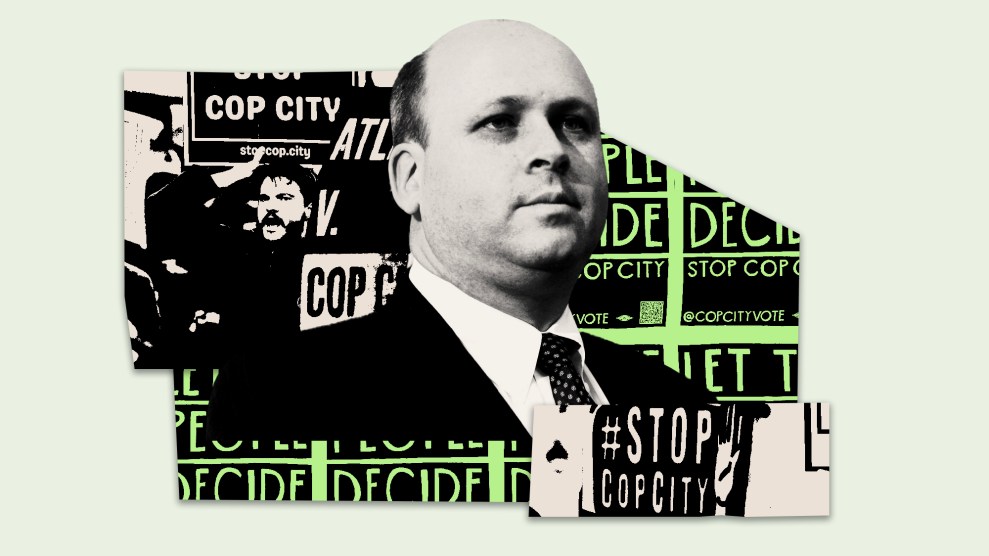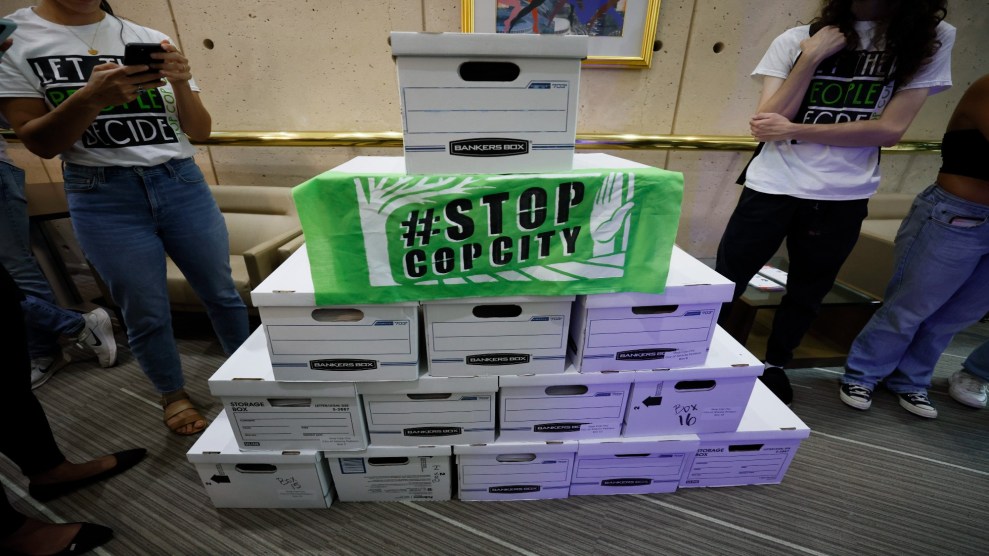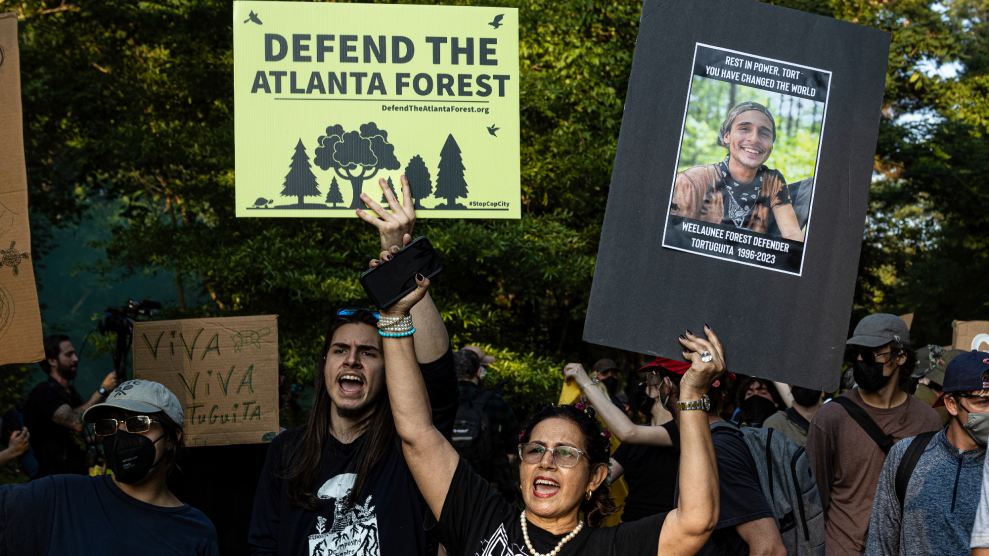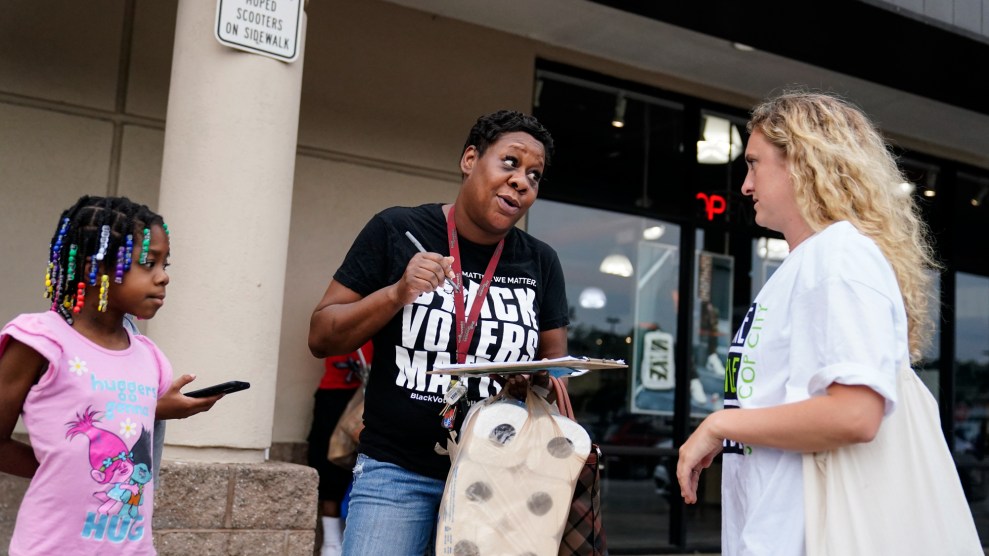
Mother Jones; Jim Mone/AP, Alex Slitz/AP, Brynn Anderson/AP
One of the most prominent Democratic Party-aligned law firms, Elias Law Group—led by noted election lawyer Marc Elias—has waded into the legal battle surrounding the proposed ballot referendum for Atlanta’s Public Safety Training Center (PSTC), better known as “Cop City.”
On Monday, the Vote To Stop Cop City Coalition—the organization leading the campaign to place the building of the controversial police training center onto the ballot for a citywide vote—sent a memorandum to the city government with a clear message: Atlanta must not engage in voter suppression on the referendum.
The memo includes a draft of a proposed ordinance that, if adopted, would standardize the city’s petition review process for ballot referendums and prevent the use of the discredited verification tactic known as “signature matching,” according to a copy shared exclusively with Mother Jones. A representative from the Vote To Stop Cop City coalition also told Mother Jones that Atlanta City Council member Liliana Bakhtiari will be introducing the ordinance to the council.
The drafted ordinance is supported by the Elias Law Group (ELG), helmed by Marc Elias, one of the most prolific attorneys in the country on voting rights litigation and threats to democracy. In the past, Elias has advised both the Democratic National Senatorial Committee and the Democratic Congressional Campaign Committee. He is the former counsel for the Democratic National Committee and the White House under President Joe Biden. Elias’ firm oversaw Democrats’ opposition to most of the lawsuits from Trump allies attempting to overturn the 2020 presidential election. In 2018, the New York Times called him arguably “one of the most influential of unelected Democrats in Washington.”
Elias’ entrance into the Cop City debate is part of a broader shift. As activists have attempted to put the facility up for a vote, local politicians and officials have delayed or stalled the process—using tactics Democratic politicians have repeatedly called out in Georgia as a hindrance to democracy when done by Republicans. The anti-Cop City protests have now added another flank of support: Mainstream Democrats frustrated by subversion of election procedures.
It means Elias’ firm finds itself aligned against an unexpected opponent: Mayor Andre Dickens, a Democrat and member of the 2024 Biden-Harris campaign advisory board, along with a majority-Democrat city council. Several high-profile Democrat and voting-rights stalwarts have come out against Mayor Dickens and the city of Atlanta’s handling of the referendum petition process, including former gubernatorial candidate and state legislator Stacey Abrams, Senator Raphael Warnock, Bernice King, and a long list of Georgia-based voting rights organizations. Dickens is joined in his support for the facility by Georgia’s Republican Governor Brian Kemp.
As I previously reported, the referendum petition to put Cop City on the ballot was launched in June as one of the final attempts in a multi-year movement to stop the construction of the massive police training center. The campaign to stop Cop City has taken on a diversity of tactics including militant forest defense, extensive litigation in court, and lobbying of elected officials like the city council. The repression has been intense and widespread. Georgia law enforcement killed one protester in a forest raid. (The Georgia Bureau of Investigation maintains that the protester shot first, a claim which activists vehemently refute.) Over 60 protesters have been indicted on either domestic terrorism or racketeering charges that civil liberty groups have called unprecedented.
The referendum campaign had an August deadline to collect 58,000 signatures to put the potential building of Cop City up for a vote this November. In July, a federal judge ruled that non-Atlanta residents, such as those in unincorporated DeKalb County, where Cop City is being built, were allowed to collect signatures for the petition. (Only Atlanta residents eligible to vote can sign the petition). This gave the referendum campaign an updated September deadline.
Then, in August, as the referendum campaign prepared to turn in over 100,000 signatures—well over the threshold needed to qualify for the ballot—the city clerk of Atlanta announced that the city would use a method called “signature matching” as part of their verification process. Signature matching is supposedly a way to prevent fraud, in which a voter’s signature on a ballot, or in this case petition, is confirmed to correspond with a signature from the same voter registered in the state’s database. But it has been criticized widely as a method of voter suppression.
The clerk’s announcement prompted more than 25 of the leading voting rights groups in Georgia to condemn Mayor Dickens and the city government for using a practice typically associated with Republicans’ attempts to disenfranchise voters. In 2018, Georgia’s Gwinnett County was the subject of two lawsuits over signature matching. When the data was analyzed, experts found that Black voters were almost three times as likely to have their ballots rejected as white voters.
At the same time city officials announced the controversial verification process, they simultaneously appealed the July decision that extended the deadline. The city’s attorneys argued that the entire petition process was invalid. In September, the 11th Circuit Court of Appeals issued a stay, halting the July decision. This put the entire referendum campaign into a state of limbo. And it prompted Mark Cohen, the federal judge from the July ruling, to admonish “the vacillating positions of the City of Atlanta throughout this litigation.”
“The city could have avoided the conundrum that now exists,” wrote Cohen. “But the city instead opted to approve a petition for a referendum it believed and later contended was illegal. A proverb dating back over four centuries ago once again applies here: Honesty is the best policy.”
Soon after Cohen’s comments, Mayor Dickens was taken to task by United States Senator Raphael Warnock, who sent a stern letter to the mayor expressing concern about “how the City decided to implement signature match.” (Dickens responded to Warnock with an 11-page letter defending the city’s procedure as “best in class.”)
The draft ordinance shared with Mother Jones attempts to establish a cut-and-dry process that avoids suppression. The draft ordinance states that a petition signature would be invalidated if the name and other information do not correspond to a registered Atlanta voter, if the petition was signed past the stated deadline, if the signature entry is a duplicate of another, or if the petition is not signed at all. In a section outlining a list of discrepancies that would not invalidate a signature entry, a bullet point reads, “[if] the signature does not appear to match the signature on record.”
This is important for voting rights advocates because, due to a number of factors—someone recently hospitalized, someone who is disabled, or someone for whom English is their second language—signatures may look different enough in different contexts to be falsely invalidated. As the ACLU wrote in 2018, “signature match laws disproportionately impact voters already on the margins.”
The draft ordinance also includes new rules on the public’s right to observe the petition review and additional directions on how potential voters will be able to “cure” their signatures if they end up marked invalid.
“Enacting a fair, open petition review process at this junction is critical,” said Emma Olson Sharkey, Counsel at Elias Law Group in a statement. “The right to vote is sacrosanct and citizens petitioning their government for direct democracy deserve to have their signatures fairly verified and their voices heard.”
Sharkey, who specializes in ballot referendums, co-authored a report for Democracy Docket—a media project and database from Elias that tracks election and voting-rights-related legal cases—arguing that Republicans are becoming “increasingly hostile” to ballot referendums. It specifically noted the problems of signature matching.
In the case of Cop City and the Atlanta government, the hostility toward democracy is coming from both the Republican and Democratic Party.
Many of the organizations that are in the Vote To Stop Cop City Coalition and that have criticized the city’s obstructionist tactics in the referendum process are the same organizations that helped deliver the state to President Biden in 2020 by a thin margin. A slim victory that Elias worked hard to prevent Trump from overturning.
“The margin of victory in Georgia was 11,000 votes. If I’m the Georgia Democrats, I’m freaking out. Because if they don’t put [Cop City] on the ballot, it will have political repercussions,” said the representative from Vote To Stop Cop City coalition, who previously worked for a prominent Georgia-based voting rights organization. “They’re choosing to erode democracy over this facility.”
Correction, December 4: An earlier version of this story misstated the name of Marc Elias’ firm. It is Elias Law Group.














